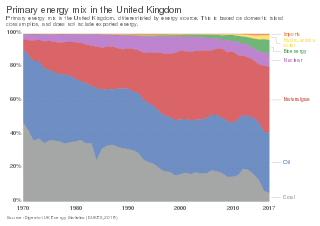
Biofuel is a fuel that is produced over a short time span from biomass, rather than by the very slow natural processes involved in the formation of fossil fuels such as oil. Biofuel can be produced from plants or from agricultural, domestic or industrial biowaste. Biofuels are mostly used for transportation, but can also be used for heating and electricity. Biofuels are regarded as a renewable energy source. The use of biofuel has been subject to criticism regarding the "food vs fuel" debate, varied assessments of their sustainability, and possible deforestation and biodiversity loss as a result of biofuel production.

In 2022, 79.6% of Taiwan's electricity generation came from fossil fuels, 9.1% from nuclear, 8.6% from renewables, and 1.2% from hydro. Taiwan relies on imports for almost 98% of its energy, which leaves the island's energy supply vulnerable to external disruption. In order to reduce this dependence, the Ministry of Economic Affairs' Bureau of Energy has been actively promoting energy research at several universities since the 1990s.

The energy policy of the United Kingdom refers to the United Kingdom's efforts towards reducing energy intensity, reducing energy poverty, and maintaining energy supply reliability. The United Kingdom has had success in this, though energy intensity remains high. There is an ambitious goal to reduce carbon dioxide emissions in future years, but it is unclear whether the programmes in place are sufficient to achieve this objective. Regarding energy self-sufficiency, UK policy does not address this issue, other than to concede historic energy security is currently ceasing to exist.
Renewable Fuels are fuels produced from renewable resources. Examples include: biofuels, Hydrogen fuel, and fully synthetic fuel produced from ambient carbon dioxide and water. This is in contrast to non-renewable fuels such as natural gas, LPG (propane), petroleum and other fossil fuels and nuclear energy. Renewable fuels can include fuels that are synthesized from renewable energy sources, such as wind and solar. Renewable fuels have gained in popularity due to their sustainability, low contributions to the carbon cycle, and in some cases lower amounts of greenhouse gases. The geo-political ramifications of these fuels are also of interest, particularly to industrialized economies which desire independence from Middle Eastern oil.
Biofuel is fuel that is produced from organic matter (biomass), including plant materials and animal waste. It is considered a renewable source of energy that can assist in reducing carbon emissions. The two main types of biofuel currently being produced in Australia are biodiesel and bioethanol, used as replacements for diesel and petrol (gasoline) respectively. As of 2017 Australia is a relatively small producer of biofuels, accounting for 0.2% of world bioethanol production and 0.1% of world biodiesel production.

Energy security is the association between national security and the availability of natural resources for energy consumption. Access to cheaper energy has become essential to the functioning of modern economies. However, the uneven distribution of energy supplies among countries has led to significant vulnerabilities. International energy relations have contributed to the globalization of the world leading to energy security and energy vulnerability at the same time.

Biofuels are renewable fuels that are produced by living organisms (biomass). Biofuels can be solid, gaseous or liquid, which comes in two forms: ethanol and biodiesel and often replace fossil fuels. Many countries now use biofuels as energy sources, including Sweden. Sweden has one of the highest usages of biofuel in all of Europe, at 32%, primarily due to the widespread commitment to E85, bioheating and bioelectricity.
Second-generation biofuels, also known as advanced biofuels, are fuels that can be manufactured from various types of non-food biomass. Biomass in this context means plant materials and animal waste used especially as a source of fuel.

Fossil fuel phase-out is the gradual reduction of the use and production of fossil fuels to zero, to reduce deaths and illness from air pollution, limit climate change, and strengthen energy independence. It is part of the ongoing renewable energy transition, but is being hindered by fossil fuel subsidies.

Renewable energy in Finland increased from 34% of the total final energy consumption (TFEC) in 2011 to 48% by the end of 2021, primarily driven by bioenergy (38%), hydroelectric power (6.1%), and wind energy (3.3%). In 2021, renewables covered 53% of heating and cooling, 39% of electricity generation, and 20% of the transport sector. By 2020, this growth positioned Finland as having the third highest share of renewables in TFEC among International Energy Agency (IEA) member countries.
The biofuel sector in the United Kingdom, under the auspices of the government's Renewable Transport Fuel Obligation (RTFO), has been progressing towards enhanced sustainable energy solutions. Marking a significant stride in this direction was the government's endorsement and introduction of E10 biofuel in late 2021. This fuel blend, consisting of 90% regular unleaded gasoline and 10% ethanol, was introduced as part of an initiative to reduce greenhouse gas emissions (GHG) from transport fuels. The introduction of E10 led to a shift in the renewable fuel landscape in the UK, particularly influencing an increase in the utilization of non-waste feedstocks. In the year 2022, the biofuel sector, as per government reports, achieved a reduction in GHG emissions by 82% in comparison to traditional fossil fuels.
Energy subsidies are measures that keep prices for customers below market levels, or for suppliers above market levels, or reduce costs for customers and suppliers. Energy subsidies may be direct cash transfers to suppliers, customers, or related bodies, as well as indirect support mechanisms, such as tax exemptions and rebates, price controls, trade restrictions, and limits on market access.

Sustainable biofuel is biofuel produced in a sustainable manner. It is not based on petroleum or other fossil fuels. It includes not using plants that are used for food stuff to produce the fuel thus disrupting the world's food supply.

The use of biofuels varies by region. The world leaders in biofuel development and use are Brazil, United States, France, Sweden and Germany.
Strict sustainability standards for biofuel in the European Union (EU) are set by the European Commissioner on Energy. Biofuels are considered a renewable alternative to fossil fuels in the transportation sector for the EU. The EU has played a large role in increasing the use of biofuels in member states; however, it has also aimed, to some extent, to mitigate the potential negative impacts of biofuel production. Current EU legislation on biofuels includes a goal to increase renewable energy consumption by 20%, eliminate biofuel feedstock sourced from carbon-rich land, accounting for emissions caused from land use change as well as solely biofuel usage, and reducing greenhouse gas intensities from fuels used in transport and machinery.

A low-carbon fuel standard (LCFS) is an emissions trading rule designed to reduce the average carbon intensity of transportation fuels in a given jurisdiction, as compared to conventional petroleum fuels, such as gasoline and diesel. The most common methods for reducing transportation carbon emissions are supplying electricity to electric vehicles, supplying hydrogen fuel to fuel cell vehicles and blending biofuels, such as ethanol, biodiesel, renewable diesel, and renewable natural gas into fossil fuels. The main purpose of a low-carbon fuel standard is to decrease carbon dioxide emissions associated with vehicles powered by various types of internal combustion engines while also considering the entire life cycle, in order to reduce the carbon footprint of transportation.

Energy in Sweden describes energy and electricity production, consumption and import in Sweden. Electricity sector in Sweden is the main article of electricity in Sweden. The Swedish climate bill of February 2017 aims to make Sweden carbon neutral by 2045. The Swedish target is to decline emission of climate gases 63% from 1990 to 2030 and international transportation excluding foreign flights 70%. By 2014 just over half of the country's total final energy consumption in electricity, heating and cooling and transport combined was provided by renewables, the highest share amongst the then 28 EU member countries. About a third of Sweden's electricity is generated by nuclear power. In generating a year's worth of this energy, Swedes generate about 4 tonnes of CO2 emissions each. Since 2010, sustainability measures have reduced total emissions even as the population has increased.
Substitutional fuels are fuels that can replace, either partially or completely, conventional fuels. It includes biodiesel, biogas, alcohol, myco-diesel, algal fuel, and metal fuel. They have applications to replace conventional fuels in functions such as transportation, although they still compose a small proportion of global fuel sources. Lots of substitutional fuel use is the result of government-enforced mandates, exemptions, or subsidies.

Most energy in Israel comes from fossil fuels. The country's total primary energy demand is significantly higher than its total primary energy production, relying heavily on imports to meet its energy needs. Total primary energy consumption was 304 TWh (1.037 quad) in 2016, or 26.2 million tonne of oil equivalent.
Biofuels play a major part in the renewable energy strategy of Denmark. Denmark is using biofuel to achieve its target of using 100% renewable energy for all energy uses by 2050. Biofuels provide a large share of energy sources in Denmark when considering all sectors of energy demand. In conjunction with Denmark's highly developed renewable energy resources in other areas, biofuels are helping Denmark meet its ambitious renewable energy targets.















